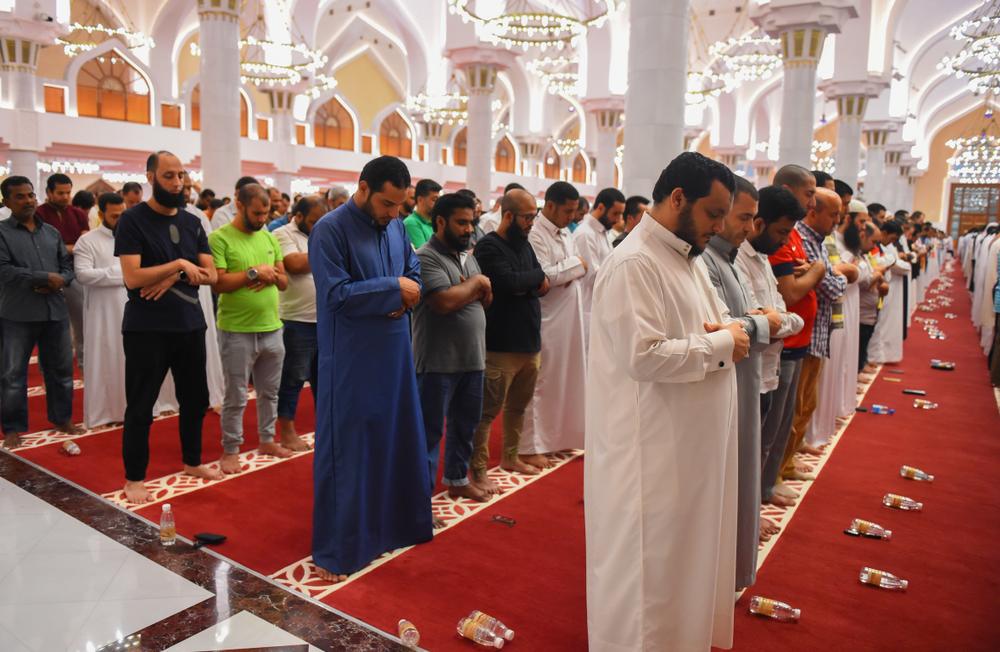
Taraweeh prayers are an important part of Ramadan. During the holy month, the believers spend their days fasting and nights glorifying Allah (SWT) during prayers. Taraweeh brings together individuals from different cultures who seek the blessings of Ramadan in congregation. Also known as qiyam, the night prayers create unity amongst the believers. The nights of Ramadan come alive, with worshippers staying awake most of the night, contributing to the vibrance of the month. The mosques buzz with excitement throughout the month, filling the community with a beautiful ambience.
Allah (SWT) has made Taraweeh in Ramadan a means of forgiveness and salvation for believers. The Messenger of Allah (SAW) said:
“Whoever prays qiyam in Ramadan out of faith and in the hope of reward, his previous sins will be forgiven.” [Bukhari 37]
The last 10 nights of Ramadan promise greater rewards. The Prophet (SAW) used to strive hard in worship during this time, seeking the night of Qadr. The believers are encouraged to increase in worship following his illustrious example in the final 10 nights. In a hadith, the Messenger of Allah (SAW) said about the prayers performed on this night:
“Whoever spends Laylat al-Qadr in prayer out of faith and in the hope of reward, his previous sins will be forgiven.” [Bukhari 1768]
Muslims pray Taraweeh all of Ramadan to achieve multiplied rewards and to secure the blessings of Laylat-al-Qadr, as instructed by the Prophet (SAW).
The origin of Taraweeh prayers in Ramadan dates back to the time of the Prophet (SAW). According to sound reports, the Prophet (SAW) led the companions during qiyam on some occasions but prayed individually for the rest of the month. Taraweeh prayers in Ramadan remained an individual act of worship during the time of the Prophet (SAW) and Abu Bakar, the first Khalifah of Muslims. However, Umar R.A. brought the worshippers behind one Imam during his rule. It is reported that he decided to do so by seeing people praying in scattered groups during his visit to the mosque. Umar united the worshippers behind Ubayy ibn Ka‘b, who led Muslims of the time in their Taraweeh prayer.
Taraweeh is a voluntary prayer that carries enormous rewards. The Messenger of Allah (SAW) did not lead Muslims in Taraweeh every night out of the fear that it may become compulsory for them, causing them hardship. However, Taraweeh has been made a matter of abundant reward, as mentioned in the above-mentioned hadith.
In an answer to the question about night prayers, the Prophet (SAW) said:
“Prayers at night are to be offered two by two (two rak’as at a time). If any of you fears that the time of dawn is approaching, then let him pray one rak’a as Witr.” [Bukhari 846]
As mentioned above, Taraweeh is prayed as two rak’as at a time. The total number of rak’as for Taraweeh is a matter of disagreement amongst scholars. Traditionally, Taraweeh is observed at the mosque. The common number of rak’as followed by most mosques is twenty and eight. It is advisable to consult your local Imam for further guidance in this regard.
Ramadan prayer of Taraweeh is performed by reciting a portion of the Quran. Those praying by themselves should recite whatever they know and can read with ease.
Taraweeh contains great significance for Hafiz of the Quran. It brings a great opportunity for those who have memorised the Quran to revise all the chapters and participate in leading the congregation. Ramadan Taraweeh is a glorious tradition of Islam where the whole Quran is completed from memory within one month. The beauty of the recitation has a soothing impact on the attendees, illustrating the glory of the divine revelation.
The night prayer is an aspect of Ramadan in which young children can be involved. Observing Taraweeh as a family is a great way to introduce kids to acts of worship in the holy month. It will strengthen their bond with Allah (SWT) and teach them about the rules of prayer. While small children do not need to pray qiyam, they can join in the obligatory prayer and be there for a short time to observe Taraweeh taking place.
As discussed above, night prayer is a great activity for the whole family to perform together. Women can also benefit from the Quran being recited during Ramadan Taraweeh. However, in case of hardship or responsibility for very young children, there is the option for praying Taraweeh at home for both women and men. According to some scholars, praying Taraweeh at home is better because this is established from the Sunnah of the Prophet (SAW), who prayed individually during most nights of Ramadan.
Taraweeh prayers provide a greater chance of giving in charity. Many fundraising campaigns take place at the time of night prayers. Different charitable organisations put up donation appeal boxes at the mosque. The believers can give their Sadaqah, Fidya or Zakah by card payments or in cash, if convenient, before or after the prayer.
For those praying at home, there are online appeals and options to donate from the comfort of their homes. You can donate your contributions to UKIM online and earn the reward of supporting people in need in the holy month of Ramadan.
Copyright © 2025 UKIM All Rights Reserved.
UK Registered Charity Since 1962
Charity Registration No. 250275


